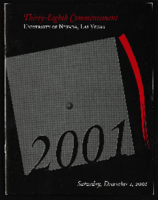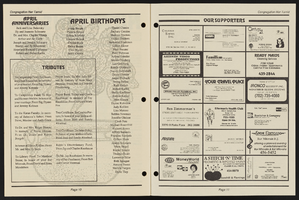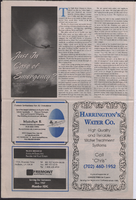Search the Special Collections and Archives Portal
Search Results

University of Nevada, Las Vegas (UNLV) 38th commencement program
Date
Archival Collection
Description
Commencement program from University of Nevada, Las Vegas Commencement Programs and Graduation Lists (UA-00115).
Text

University of Nevada, Las Vegas (UNLV) Fall 2017 commencement program
Date
Archival Collection
Description
Commencement program from University of Nevada, Las Vegas Commencement Programs and Graduation Lists (UA-00115).
Text

Transcript of interview with Ernest Jackson Jr. by Larry E. Cooper, March 1, 1980
Date
Archival Collection
Description
On March 1, 1980, Larry E. Cooper interviewed general contractor Ernest (Ernie) Jackson Junior (born December 6th, 1932 in Bruce, Mississippi) in Cooper’s home about his experiences in the Westside as a Black Las Vegas resident. Jackson Jr. discusses the lack of property buyers on the Westside and his goals of improving the Westside by building on the land. Jackson Jr. also discusses his youth as a baseball star for Las Vegas High School in the fifties.
Text

Christine Szukala oral history interview: transcript
Date
Archival Collection
Description
Oral history interview with Christine Szukala conducted by Bridgette Foote on November 12, 2021 for Reflections: The Las Vegas Asian American and Pacific Islander Oral History Project. Christine shares her family history and the story of her Thai mother and American Air Force father who met in Thailand and married before moving to the United States in 1970. She talks about her upbringing in Las Vegas, Nevada near Nellis Air Force base with her six siblings. Christine discusses her beliefs of how her newly immigrated mother adapted to American life, including altering her recipes to fit her husband's taste and reducing her visits to nearby Buddhist temples.
Text
Kirsten Searer (Nevada Public Education Foundation) oral history interview conducted by Magdalena Martinez and Taylor Cummings: transcript
Date
Archival Collection
Description
From the Lincy Institute "Perspectives from the COVID-19 Pandemic" Oral History Project (MS-01178) -- Education sector interviews file.
Text

Abraham Gomez interview, December 6, 2019: transcript
Date
Archival Collection
Description
Interviewed by Elsa Lopez. Abraham Gomez is a College Navigator for the Nevada Treasurer's Office where he is responsible for providing and distributing information on post-secondary resources that may enable Nevadans to go to college. Gomez was born and raised in Las Vegas, Nevada and grew up on the East Side near Desert Pines High School. He received an Associate of Arts from the College of Southern Nevada before obtaining a bachelor's degree in Communication Studies from the University of Nevada, Reno. After graduating he worked as a GEAR UP Ambassador for Nevada State College where he advised a cohort of 46 low-income students on the importance of continuing their education. He has volunteered with various organizations throughout Southern Nevada and continues to work to better his community and make education accessible to students everywhere.
Text

Transcript of interview with Carl Ciliax by Gary Wood, March 8, 1980
Date
Archival Collection
Description
On March 8, 1980, Gary Wood interviewed Carl Ciliax (born 1941 in Las Vegas, Nevada) about his experiences living in Nevada. Ciliax first describes his family history, his early interests in wildlife, and his background and education in artwork. Ciliax then discusses his early experiences in hunting and his eventual interest in conservationism and preservation, including his involvement with organizations that sought the protection of desert bighorn sheep and the protection of wildlife in general. The two talk more about wildlife, the early development of Las Vegas, and the effects of the atomic testing. The interview concludes with Ciliax’s recollection of recreational activities and some of his thoughts on conservationism.
Text

Transcript of interview with Joyce Moore by Claytee D. White, January 22, 2013
Date
Archival Collection
Description
Joyce Moore's family moved to Las Vegas from Chicago in 1953, when she was eight years old. She attended Rancho High School, married and had three daughters, and currently lives in Las Vegas. Joyce's father was in the gaming industry and her mother was a nurse. Growing up in Las Vegas meant going to shows with her mother, spending summer days in the pool at the Showboat Hotel, and riding horses to the Last Frontier. While a teenager at Rancho High school, Joyce worked at several movie theaters including the Huntridge, went to school dances and marched in the Hellodorado Parade. After her divorce, Joyce returned to work to support herself and her children, first at the Daily Fax then later on the Strip at the Aladdin and Circus, Circus doing a variety of office and accounting jobs. As a lark she and a friend applied to work as cocktail waitresses at the MGM; she was hired and spent the next five years in a job that was by turns interesting, exhausting, frustrating and fun. This interview covers several periods of Joyce's life - her childhood, teen years, and early adult life - and what it was like to grow up, live and work in Las Vegas in from the mid-1950s until the mid-1970s.
Text


